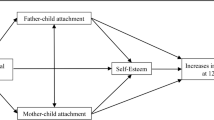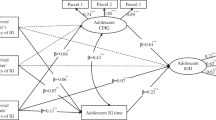Abstract
Problematic use of Internet games is recognized as a significant mental health issue for adolescents and their families. The present study investigated features of the parent-child relationship, including trust, communication, and alienation, in the context of adolescents’ Internet gaming problems. A total of 824 secondary school students (402 males and 422 females) aged 12 to 17 years completed a survey on Internet gaming activities; the DSM-5 Internet Gaming Disorder (IGD) checklist and the Inventory of Parent and Peer Attachment (IPPA). The results showed that adolescents with Internet gaming problems reported significantly less trust and communication, and greater anger and alienation, in their maternal and paternal relationships, as compared to adolescents without gaming problems. Adolescents at high risk of IGD reported significantly more gaming time with strangers (32.6 % vs. 7.9 %) and were more likely to play massively multiplayer online (MMO) games than non-problem adolescents. However, IPPA total scores did not significantly predict IGD symptoms, after controlling for gender and level of gaming activity, and IPPA scores did not mediate the association between Internet gaming time and IGD symptoms. Although family conflict can be one of the negative consequences of problematic gaming, these results suggest that, based on adolescent self-report, parent-child relationships may be only a weak correlate of Internet gaming problems in general.
Similar content being viewed by others
References
Allison, S. E., von Wahlde, L., Shockley, T., & Gabbard, G. O. (2006). The development of the self in the era of the internet and role-playing fantasy games. American Journal of Psychiatry, 163, 381–385.
Armsden, G. C., & Greenberg, M. T. (1987). The inventory of parent and peer attachment: individual differences and their relationship to psychological well-being in adolescence. Journal of Youth and Adolescence, 16, 427–454.
Bowlby, J. (1969). Attachment and loss. Volume 1: attachment. New York: Basic Books.
Brook, J. S., Brook, D. W., & Whiteman, M. (1999). Older sibling correlates of younger sibling drug use in the context of parent-child relations. Genetic, Social, and General Psychology Monographs, 125, 451–451.
Caplan, S. E. (2010). Theory and measurement of generalised problematic internet use: a two-step approach. Computers in Human Behavior, 26, 1089–1097.
Çelik, Ç. B., & Odacı, H. (2013). The relationship between problematic internet use and interpersonal cognitive distortions and life satisfaction in university students. Children and Youth Services Review, 35, 505–508.
Chan, P. A., & Rabinowitz, T. (2006). A cross-sectional analysis of video games and attention deficit hyperactivity disorder symptoms in adolescents. Annals of General Psychiatry, 5, 1–10.
Cohen, J. (1992). A power primer. Psychological Bulletin, 112, 155.
Davis, R. A. (2001). A cognitive-behavioral model of pathological internet use. Computers in Human Behavior, 17, 187–195.
Ferguson, C. J., Coulson, M., & Barnett, J. (2011). A meta-analysis of pathological gaming prevalence and comorbidity with mental health, academic and social problems. Journal of Psychiatric Research, 45, 1573–1578.
Gerra, G., Leonardi, C., Cortese, E., Zaimovic, A., Dell’Agnello, G., Manfredini, M., & Donnini, C. (2009). Childhood neglect and parental care perception in cocaine addicts: relation with psychiatric symptoms and biological correlates. Neuroscience & Biobehavioral Reviews, 33, 601–610.
Holtz, P., & Appel, M. (2011). Internet use and video gaming predict problem behavior in early adolescence. Journal of Adolescence, 34, 49–58.
Kardefelt-Winther, D. (2014). A conceptual and methodological critique of internet addiction research: towards a model of compensatory internet use. Computers in Human Behavior, 31, 351–354.
Kim, E. J., Namkoong, K., Ku, T., & Kim, S. J. (2008). The relationship between online game addiction and aggression, self-control and narcissistic personality traits. European Psychiatry, 23, 212–218.
King, D. L., & Delfabbro, P. H. (2014a). My Facebook family: should adolescent psychiatric evaluation include information about online social networks? Australian and New Zealand Journal of Psychiatry, 48, 805–808.
King, D. L., & Delfabbro, P. H. (2014b). The cognitive psychology of internet gaming disorder. Clinical Psychology Review, 34, 298–308.
King, D. L., & Delfabbro, P. H. (2014c). Internet gaming disorder treatment: a review of definitions of diagnosis and treatment outcome. Journal of Clinical Psychology, 70, 942–955.
King, D. L. & Delfabbro, P. H. (2016). The cognitive psychopathology of internet gaming disorder in adolescence. Journal of Abnormal Child Psychology. doi:10.1007/s10802-016-0135-y.
King, D. L., Delfabbro, P. H., Griffiths, M. D., & Gradisar, M. (2012). Cognitive-behavioral approaches to outpatient treatment of internet addiction in children and adolescents. Journal of Clinical Psychology, 68, 1185–1195.
King, D. L., Delfabbro, P. H., Zwaans, T., & Kaptsis, D. (2013). Clinical features and axis I comorbidity of Australian adolescent pathological internet and video-game users. Australian and New Zealand Journal of Psychiatry, 47, 1058–1067.
Király, O., Urbán, R., Griffiths, M. D., Ágoston, C., Nagygyörgy, K., Kökönyei, G., & Demetrovics, Z. (2015). Psychiatric symptoms and problematic online gaming: the mediating effect of gaming motivation. Journal of Medical Internet Research, 17, e88.
Kuss, D. J., & Griffiths, M. D. (2012). Internet gaming addiction: a systematic review of empirical research. International Journal of Mental Health and Addiction, 10, 278–296.
Laursen, B., & Collins, W. A. (2009). Parent-child relationships during adolescence. Handbook of Adolescent Psychology. New York: Wiley.
Liau, A. K., Khoo, A., & Ang, P. H. (2008). Parental awareness and monitoring of adolescent internet use. Current Psychology, 27, 217–233.
Liu, C. Y., & Kuo, F. Y. (2007). A study of internet addiction through the lens of the interpersonal theory. Cyberpsychology & Behavior, 10, 799–804.
Liu, Q. X., Fang, X. Y., Deng, L. Y., & Zhang, J. T. (2012). Parent–adolescent communication, parental internet use and internet-specific norms and pathological internet use among Chinese adolescents. Computers in Human Behavior, 28, 1269–1275.
Liu, Q. X., Fang, X. Y., Zhou, Z. K., Zhang, J. T., & Deng, L. Y. (2013). Perceived parent-adolescent relationship, perceived parental online behaviors and pathological internet use among adolescents: gender-specific differences. PloS One, 8, e75642.
Lo, S. K., Wang, C. C., & Fang, W. (2005). Physical interpersonal relationships and social anxiety among online game players. Cyberpsychology & Behavior, 8, 15–20.
Maraz, A., Király, O., & Demetrovics, Z. (2015). The diagnostic pitfalls of surveys: if you score positive on a test of addiction, you still have a good chance not to be addicted. A response to Billieux et al. 2015. Journal of Behavioral Addictions, 4, 151–154.
Mentzoni, R. A., Brunborg, G. S., Molde, H., Myrseth, H., Skouverøe, K. J. M., Hetland, J., & Pallesen, S. (2011). Problematic video game use: estimated prevalence and associations with mental and physical health. Cyberpsychology, Behavior and Social Networking, 14, 591–596.
Milani, L., Osualdella, D., & Di Blasio, P. (2009). Quality of interpersonal relationships and problematic internet use in adolescence. Cyberpsychology & Behavior, 12, 681–684.
Pace, C. S., San Martini, P., & Zavattini, G. C. (2011). The factor structure of the inventory of parent and peer attachment (IPPA): a survey of Italian adolescents. Personality and Individual Differences, 51, 83–88.
Padilla-Walker, L. M., Coyne, S. M., Fraser, A. M., Dyer, W. J., & Yorgason, J. B. (2012). Parents and adolescents growing up in the digital age: latent growth curve analysis of proactive media monitoring. Journal of Adolescence, 35, 1153–1165.
Parker, J. S., & Benson, M. J. (2004). Parent-adolescent relations and adolescent functioning: self-esteem, substance abuse, and delinquency. Adolescence, 39, 519.
Paterson, J., Pryor, J., & Field, J. (1995). Adolescent attachment to parents and friends in relation to aspects of self-esteem. Journal of Youth and Adolescence, 24, 365–376.
Petry, N. M., Rehbein, F., Gentile, D. A., Lemmens, J. S., Rumpf, H.-J., Mößle, T., et al. (2014). An international consensus for assessing internet gaming disorder using the new DSM-5 approach. Addiction, 109, 1399–1406.
Pies, R. (2009). Should DSM-V designate “internet addiction” a mental disorder? Psychiatry, 6, 31–37.
Porter, G., Starcevic, V., Berle, D., & Fenech, P. (2010). Recognising problem video game use. Australian and New Zealand Journal of Psychiatry, 44, 120–128.
Richards, R., McGee, R., Williams, S. M., Welch, D., & Hancox, R. J. (2010). Adolescent screen time and attachment to parents and peers. Archives of Pediatrics & Adolescent Medicine, 164, 258–262.
Rosenstein, D. S., & Horowitz, H. A. (1996). Adolescent attachment and psychopathology. Journal of Consulting and Clinical Psychology, 64, 244.
Schimmenti, A., Guglielmucci, F., Barbasio, C., & Granieri, A. (2012). Attachment disorganization and dissociation in virtual worlds: a study on problematic internet use among players of online role-playing games. Clinical Neuropsychiatry, 9, 195–202.
Schimmenti, A., Passanisi, A., Gervasi, A. M., Manzella, S., & Fama, F. I. (2014). Insecure attachment attitudes in the onset of problematic internet use among late adolescents. Child Psychiatry and Human Development, 45, 588–595.
Schinke, S. P., Fang, L., & Cole, K. C. (2008). Substance use among early adolescent girls: risk and protective factors. Journal of Adolescent Health, 43, 191–194.
Smith, L. J., Gradisar, M., & King, D. L. (2015). Parental influences on adolescent video game play: a study of accessibility, rules, limit-setting, monitoring, and cybersafety. Cyberpsychology, Behavior and Social Networking, 18, 273–279.
Thomas, N. J., & Martin, F. H. (2010). Video-arcade game, computer game and internet activities of Australian students: participation habits and prevalence of addiction. Australian Journal of Psychology, 62, 59–66.
van Den Eijnden, R. J., Spijkerman, R., Vermulst, A. A., van Rooij, T. J., & Engels, R. C. (2010). Compulsive internet use among adolescents: bidirectional parent–child relationships. Journal of Abnormal Child Psychology, 38, 77–89.
van Rooij, A. J., Schoenmakers, T. M., Vermulst, A. A., van de Eijnden, R. J. J. M., & van de Mheen, D. (2010). Online video game addiction: identification of addicted adolescent gamers. Addiction, 106, 205–212.
Xiuqin, H., Huimin, Z., Mengchen, L., Jinan, W., Ying, Z., & Ran, T. (2010). Mental health, personality, and parental rearing styles of adolescents with internet addiction disorder. CyberPsychology, Behavior, and Social Networking, 13, 401–406.
Yen, J. Y., Ko, C. H., Yen, C. F., Wu, H. Y., & Yang, M. J. (2007a). The comorbid psychiatric symptoms of internet addiction: attention deficit and hyperactivity disorder (ADHD), depression, social phobia, and hostility. Journal of Adolescent Health, 41, 93–98.
Yen, J. Y., Yen, C. F., Chen, C. C., Chen, S. H., & Ko, C. H. (2007b). Family factors of internet addiction and substance use experience in Taiwanese adolescents. Cyberpsychology & Behavior, 10, 323–329.
Zulkefly, N. S., & Wilkinson, R. B. (2015). Measuring specific attachment relationships of mother, father and peer in Malaysian adolescents. Child Indicators Research, 8, 767–788.
Acknowledgments
With thanks to the students who participated in this study, and the teachers and principals for assistance with data collection.
Author information
Authors and Affiliations
Corresponding author
Ethics declarations
Conflict of Interest
The authors report no conflicts of interest. The authors alone are responsible for the content and writing of the paper.
Financial Disclosure
This work received financial support from a 2014 RIBG Small Research Grant funded by the School of Psychology, The University of Adelaide.
Rights and permissions
About this article
Cite this article
King, D.L., Delfabbro, P.H. Features of Parent-Child Relationships in Adolescents with Internet Gaming Disorder. Int J Ment Health Addiction 15, 1270–1283 (2017). https://doi.org/10.1007/s11469-016-9699-6
Published:
Issue Date:
DOI: https://doi.org/10.1007/s11469-016-9699-6




